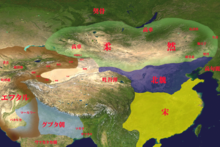User:Pequeno Rourano/sandbox
| Yujiulü Mugulü | |||||
|---|---|---|---|---|---|
 Map representing rouranos well to the north, located at the epicenter of the eastern steppe, in comparison to other states in its vicinity, with its area of influence extremely west and east, bordering the northern Wei state (北魏), appearing under the bluish color. | |||||
| Reign | 4th Century | ||||
| Coronation | 330 [1], Guangluzi Canyon | ||||
| Predecessor | There is no, title created | ||||
| Successor | Yujiulü Cheluhui | ||||
| Born | 3rd century, before 277 | ||||
| Died | 4th century | ||||
| Issue | |||||
| |||||
| House | Yujiulü Clan | ||||
| Father | Unknown | ||||
| Mother | Unknown | ||||
| Religion | tengrism | ||||
Yujiulü Mugulü ( Chinese: 郁久閭木骨閭; pinyin: Yùjiǔlǘ Mùgǔlǘ) also known as Yuğlu-yuy, Mukhur or Kurt, he was the first ruler of the Rourans.[2] It is mentioned in Chinese sources: "Wei Book" and "Northern History". Unknown real name. After his death, his son Yujiulü Cheluhui takes the throne.
| Pequeno Rourano/sandbox | |||||||
|---|---|---|---|---|---|---|---|
| Chinese | 郁久閭木骨閭 | ||||||
| Literal meaning | Yu jiulü "Wooden bone Lu" | ||||||
| |||||||
Biography[edit]
Youth and slavery of the Xianbei[edit]

De acordo com as fontes chinesas, Yùjiǔlǘ Mùgǔlǘ era escravo de origem desconhecida. Segundo a história do estado de Tuoba Wei, ele foi capturado e escravizado durante o reinado do chefe Liwei (220-277) do clã Tuoba.
The name of Mugulü[edit]
A Xianbei man had grabbed him, his hair raised his eyebrows and he had forgotten his name, his captor called him Mùgǔlǘ which means Bald, bald, or naked, in the Siambi (Xianbei) language, due to his appearances. "Mùgǔlǘ" (木 骨 閭) and "Yùjiǔlǘ" (郁 久 閭) were names of similar sound, note that they have the same final particle lǘ (閭), so their descendants were called that. and thus the Yùjiǔlǘ clan emerged. [3][4]
In free translation, Mùgǔlǘ can mean "wooden bone Lu", so most likely, his real name was Lu.[5]It could mean an offense.
Mugulü is also known for other names according to some sources.
Mùgǔlǘ's "delay" and his escape through the Gobi[edit]

After reaching adulthood, he was released, became a warrior in the Xianbei cavalry under the leadership of Ilu (308-316), and, for failing to carry out an (delayed) order, he was sentenced to death by beheading the delay in responding to your call. He escaped through the Gobi Desert to the mountains, in Guangluzi Canyon.[6]. There he grouped 100 fugitives and joined the tribe (later known as Ruru in his son's reign). Later, he had a son named Yujiulü Cheluhui, who succeeded him as soon as he passed away.[7]
Foundation of the Rouran tribe and legacy[edit]
Because his son Yujiulü Cheluhui was a warrior hero, strong and brave, he enlisted and became a soldier. This period appears to be around 330. His descendants multiplied and founded the Yùjiǔlǘ dynasty, later, his descendant Yujiulü Shelun, turns his tribe into a vast nomadic empire[8], which lasted until 555 and was conquered by the Gokturks
When Cheluhui assumes the throne, he reunites the tribe, which decided to be called "Ruru", a new nation was to come. The YuJiulü family began to have a group of people, self-commanding and self-proclaimed Rouran.
Death and succession[edit]
After Yuğlu-yuy's death, his warrior hero son, Huylu-huy, became courageous, and his government was marked by nomadism and peace.[9]
Appearances[edit]
He had a shaved head with a mane, his hair reaching his eyebrows.[10]
Other names to Mugulü[edit]
- Mukhur (mongol: "redondo, liso") - uma reconstrução hipotética do nome pelo pesquisador japonês K. Shiratori.[11]
- Kur or Kurt (Mongolian: Qur, Qurt, "beetle; wolf") is a hypothetical reconstruction of Haussig's name based on the fact that rouranos considered his wolf totem and were once called "chickens" (qur).[12]
Gallery[edit]
-
The Sixteen Chinese kingdoms approximately four years before the proclamation of Mugulü as tribal chief of the rourans
-
The Sixteen Chinese Kingdoms, approximately eight years after the founding of the tribe of rouranos. The Xianbei state of the Tuoba clan is represented as "Dai", a predecessor state to Former Qin, (前秦)
-
The Xianbei of the 3rd century, note that the Tuoba are very close
-
Map representing the region of Mongolia, 330-555 AD, next to the rouranos that ruled it, and the Tuoba, very close

See also[edit]
Bibliografia[edit]
sources[edit]
Monograph[edit]
- 内田吟風、田村実造他訳注『騎馬民族史1 正史北狄伝』 平凡社東洋文庫, 1971.
- ^ Yıldırım 2013, p. 35.
- ^ Grousset (1970), pp. 61, 585, n. 91.
- ^ https://pt.wikipedia.org/wiki/Discuss%C3%A3o:Y%C3%B9ji%C7%94l%C7%98_M%C3%B9g%C7%94l%C7%98#O_nome_de_M%C3%B9g%C7%94l%C7%98
- ^ https://zh.wikipedia.org/wiki/%E6%9C%A8%E9%AA%A8%E9%97%BE
- ^ https://az.wikipedia.org/wiki/Yuy%C3%A7z%C3%BCly%C3%BC_Muquly%C3%BC
- ^ https://ru.wikipedia.org/wiki/%D0%AE%D0%B9%D1%86%D0%B7%D1%8E%D0%BB%D1%8E%D0%B9_%D0%9C%D1%83%D0%B3%D1%83%D0%BB%D1%8E%D0%B9
- ^ Bozan 1962, p. 225.
- ^ 《魏书·蠕蠕传》
- ^ 《魏书·蠕蠕传》
- ^ https://uk.wikipedia.org/wiki/%D0%9C%D1%83%D0%B3%D1%83%D0%BB%D1%8E%D0%B9
- ^ 白鳥庫吉 1910; 内田吟風 1971: 218.
- ^ Haussig 1953; 内田吟風 1971: 218.




